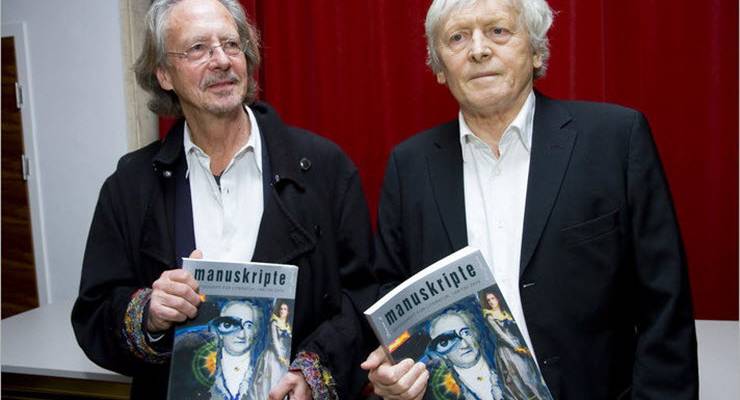
Last year, amidst a toxic, Me Too-tinged sexual assault and financial misconduct scandal, the Swedish Academy decided not to award a Nobel Prize for Literature. Instead, it has now named two winners for 2019: Polish writer Olga Tokarczuk and Austrian Peter Handke. But the joint decision may do little to quell the stench of controversy still lingering over the Swedish Academy.
While Tokarczuk appears a deserving winner, Handke has a deeply worrisome history as an apologist for atrocities committed during the Balkan wars.
During the 1990s, as Yugoslavia collapsed in a blaze of genocidal violence, Handke, who has Slovenian heritage, became known for his strident defence of Serbia. In a series of articles and media appearances, he claimed that Western propaganda had unfairly framed Serbs as aggressors and, at one point, compared their plight to demonisation of Jews in Nazi Germany (a comparison he later retracted).
Despite evidence to the contrary, Handke has denied a genocide took place at Srebrenica, where 8000 Bosnian Muslim men and boys were murdered in 1995, arguing that Muslims massacred themselves and blamed Serbs. In 2006, Handke gave a eulogy at the funeral of Slobodan Milosevic, the Serbian nationalist leader who died while on trial for war crimes at the Hague. According to Handke, Milosevic, who is linked to genocide and massacres throughout former Yugoslavia, simply “defended his people”.
Handke is the most controversial choice since 2016, when the academy gave the prize to Bob Dylan, perhaps in an attempt to troll critics who had spent years arguing it favours obscure European writers barely known in the Anglophone world. This year, the academy had appeared to be taking that criticism seriously, promising that, in future, the prize would be less male-oriented and Eurocentric.
All in all, awarding the prize to Handke is a stunningly short-sighted call for a body trying to rebound from last year’s scandal. Ironically, Handke himself has called for the abolition of the Nobel Prize for Literature in the past. If the Swedish Academy keeps giving it to genocide apologists, maybe he has a point.








Nothing in the Balkan countries has ever been black and white. The “collapse” of Yugoslavia had many players involved, not all of pure intent.
He won a prize for literature but no mention of that or any of his work in this article. I can well understand the controversy over his unrelated opinions and activities but some information and analysis of his literary achievements would at least have helped explain things a bit.
I’ve never heard of him but given the one sided nature of this polemical article I’ll search him up and maybe even read his book.
As for the alleged “stench” over last year’s non prize, was it really necessary not to award a prize thereby unjustly punishing by association all of the Academy and those who were hoping for a prize ?
Agreed. All I’ve heard about in most media coverage of this win is his apologism for Milosevic which is, indeed, awful if it is as it sounds. But why is it just automatically presumed by so many that such controversies should be disqualifying? His work, to my knowledge, has nothing to do with the subject. (By the way, while I also haven’t read any of his novels, I suspect English speakers will be most familiar with his work as scriptwriter for Wim Wenders, most notably on Wings of Desire. Handke also made a really good film himself, 1978’s The Left-Handed Woman, which I recommend without reservation!) Also, even if one does consider this decision to be indefensible, the Nobel committee have made so many howlers over the years that surely at this point it’s only a happy accident if they actually manage to get it right.